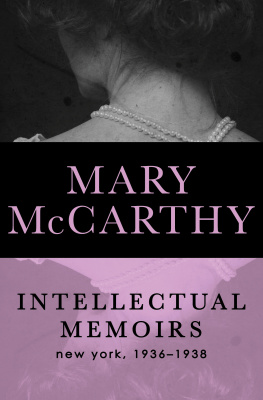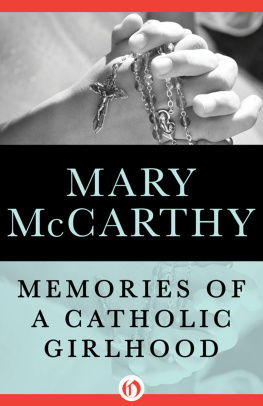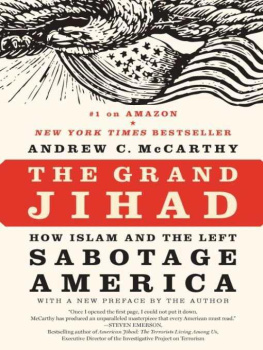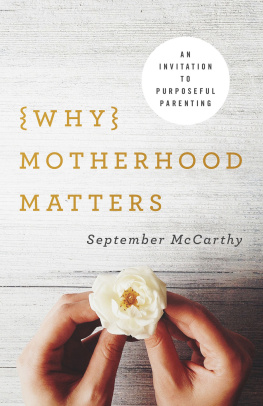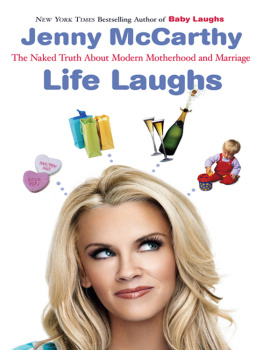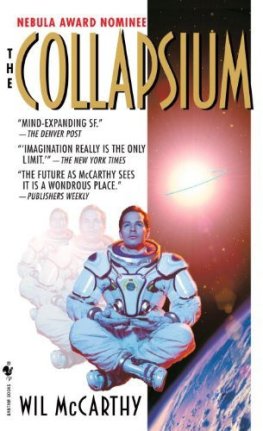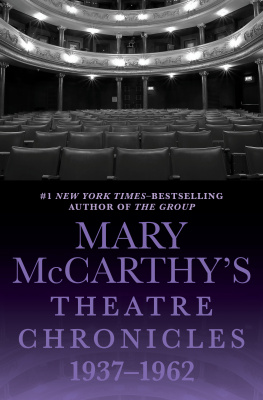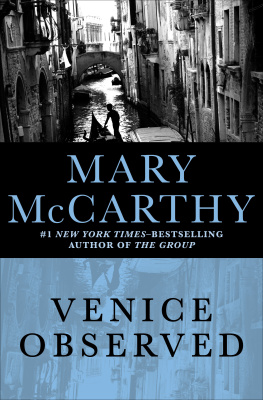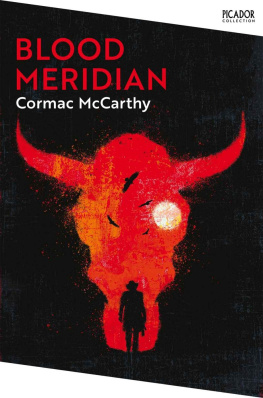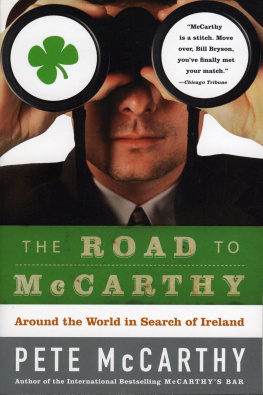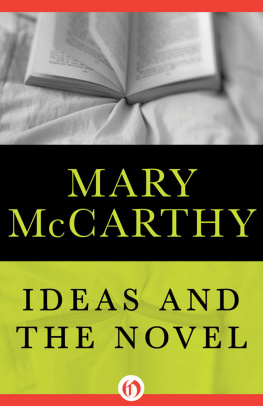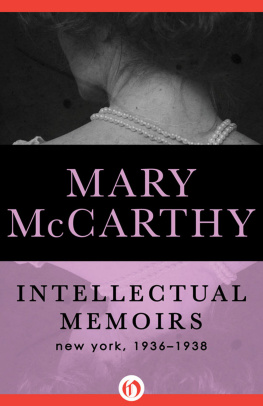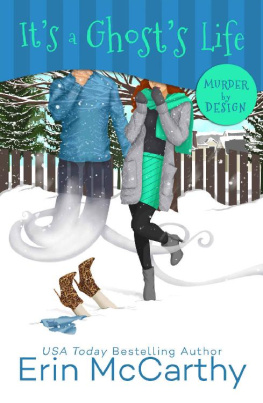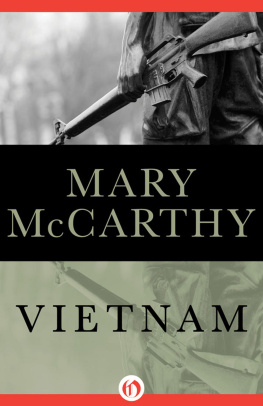
Mary McCarthys Collected Memoirs
Memories of a Catholic Girlhood
How I Grew
Intellectual Memoirs
Mary McCarthy


Memories of a Catholic Girlhood
Mary McCarthy

TO REUEL
TO THE READER
THESE MEMORIES OF MINE have been collected slowly, over a period of years. Some readers, finding them in a magazine, have taken them for stories. The assumption that I have made them up is surprisingly prevalent, even among people who know me. That Jewish grandmother of yours ... ! Jewish friends have chided me, skeptically, as though to say, Come now, you dont expect us to believe that your grandmother was really Jewish. Indeed she was, and indeed I really had a wicked uncle who used to beat me, though more than once, after some public appearance, I have had a smiling stranger invite me to confess that Uncle Myers was a hoax. I do not understand the reason for these doubts; I have read about far worse men than my cruel uncle in the newspapers, and many Gentile families possess a Jewish ancestor. Can it be that the public takes for granted that anything written by a professional writer is eo ipso untrue? The professional writer is looked on perhaps as a storyteller, like a child who has fallen into that habit and is mechanically chidden by his parents even when he protests that this time he is telling the truth.
Many a time, in the course of doing these memoirs, I have wished that I were writing fiction. The temptation to invent has been very strong, particularly where recollection is hazy and I remember the substance of an event but not the detailsthe color of a dress, the pattern of a carpet, the placing of a picture. Sometimes I have yielded, as in the case of the conversations. My memory is good, but obviously I cannot recall whole passages of dialogue that took place years ago. Only a few single sentences stand out: Theyd make you toe the chalk line, Perseverance wins the crown, My child, you must have faith. The conversations, as given, are mostly fictional. Quotation marks indicate that a conversation to this general effect took place, but I do not vouch for the exact words or the exact order of the speeches.
Then there are cases where I am not sure myself whether I am making something up. I think I remember but I am not positive. I wonder, for instance, whether the Mesdames of the Sacred Heart convent really talked as much about Voltaire as I have represented them as doing; all I am sure of is that I first heard of Voltaire from the nuns in the convent. And did they really speak to us of Baudelaire? It seems to me now extremely doubtful, and yet I wrote that they did. I think I must have thrown Baudelaire in for good measure, to give the reader an idea of the kind of poet they exalted while deploring his way of life. The rumor in the convent was that our nuns had a special dispensation to read works on the Index, and that was how we liked to think of them, cool and learned, with their noses in heretical books. When I say we, however, perhaps I mean only myself and a few other original spirits.
I have not given the right names of my teachers or of my fellow students, in the convent and later in boarding school. But all these people are real; they are not composite portraits. In the case of my near relations, I have given real names, and, wherever possible, I have done this with neighbors, servants, and friends of the family, for, to me, this record lays a claim to being historicalthat is, much of it can be checked. If there is more fiction in it than I know, I should like to be set right, in some instances, which I shall call attention to later, my memory has already been corrected.
One great handicap to this task of recalling has been the fact of being an orphan. The chain of recollectionthe collective memory of a familyhas been broken. It is our parents, normally, who not only teach us our family history but who set us straight on our own childhood recollections, telling us that this cannot have happened the way we think it did and that that, on the other hand, did occur, just as we remember it, in such and such a summer when So-and-So was our nurse. My own son, Reuel, for instance, used to be convinced that Mussolini had been thrown off a bus in North Truro, on Cape Cod, during the war. This memory goes back to one morning in 1943 when, as a young child, he was waiting with his father and me beside the road in Wellfleet to put a departing guest on the bus to Hyannis. The bus came through, and the bus driver leaned down to shout the latest piece of news:Theyve thrown Mussolini out. Today, Reuel knows that Mussolini was never ejected from a Massachusetts bus, and he also knows how he got that impression. But if his father and I had died the following year, he would have been left with a clear recollection of something that everyone would have assured him was an historical impossibility, and with no way of reconciling his stubborn memory to the stubborn facts on record.
As an orphan, I was brought up between two sets of grandparents, all of whom are now dead, beyond questioning, and who knew very little, in any case, of the daily facts of our childhood, either before or after the death of our parents. My aunts and uncles, too, were remote from our family life and took small interest in it, my brother Kevin, whose memory corroborates mine for the period of our stay in Minneapolis, was too young when my parents died to remember much about them. For events of my early childhood, I have had to depend on my own sometimes blurry recollections, on the vague and contradictory testimony of uncles and aunts, on a few idle remarks of my grandmothers, made before she became senile, and on some letters written me by a girlhood friend of my mothers. For the Minneapolis period, I have had the help of Kevin, but for later events, in Seattle, when my brothers and I were separated, I am reduced, again, chiefly to my own memory. What more ancient family history I know has been pieced together from hearsay, from newspaper clippings, old photographs, and a sort of scrapbook journal kept by my great-grandfather, who lived to be ninety-nine. This old man seems to have been the only member of the family who was alive to the interest of history. The grandmother I was closest to, his daughter-in-law (as I will show later), disliked talking about the past.
Yet the very difficulties in the way have provided an incentive. As orphans, my brother Kevin and I have a burning interest in our past, which we try to reconstruct together, like two amateur archaeologists, falling on any new scrap of evidence, trying to fit it in, questioning our relations, belaboring our own memories. It has been a kind of quest, in which Kevins wife and my husband and even friends have joined, poring over albums with us, offering conjectures: Do you think your grandmother could have been jealous of you? Could your grandfather have had a nervous breakdown?
How odd this might seem to an outsider never struck any of us until a week ago. It was a Sunday, and my brother Preston, whom I had not seen for many years, had come up from Wilmington to lunch at Kevins house in the country, bringing with him his wife and children. There were seven of us, seven adults (for we had brought a friend), having cocktails, when someonemy husband, I thinkmentioned Uncle Myers. Did Preston have a snapshot of him? Who was Uncle Myers? came the voice of Prestons wife, clear and innocent. All motion ceased, the room was frozen in incredulity. The cocktail shaker in Kevins hand halted in midair, like one of the spits turned by the cook in the story of the Sleeping Beauty.
Next page
